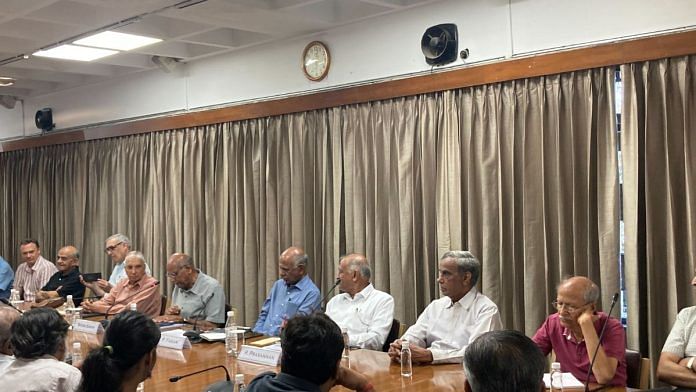For PV Narasimha Rao, the transformation of the Indian economy meant more than just improving the lives of common citizens. The former prime minister, who steered India through the economic reforms of the 1990s, saw it as a means to bypass the Mandal agitations, said his former principal information officer S Narendra.
Narendra’s new book, India’s Tipping Point: The View From 7 Race Course Road, is an insider’s account of the ‘unremarkable prime minister’ who changed India’s course in history.
“Manmohan Singh and [P.] Chidambaram carried out reforms in the vital sectors of finance and external trade. Narasimha Rao tried to reform the entirety of the governmental system brick by brick,” said Narendra, who served as Rao’s adviser during the period of the economic reforms.
At a discussion around his new book at New Delhi’s India International Centre on 6 April, Narendra made a compelling case for India’s liberalisation policy; How it helped India move on from the Mandal agitations and allowed the country to leave its Licence Raj heyday behind.
“One thing that is often missed is how PV Narasimha Rao defused the turmoil surrounding the Mandal Commission. He made it a non-political issue and made it an administrative exercise and implemented it with his minister Sitaram Kesri,” said R Prasannan, resident editor at The Week, who was one of the panellists along with former diplomat KP Fabian.
The hall, packed with an audience of former and current media persons and authors like Gurucharan Das, was keen to listen to a feel-good story about India’s economic rise.
They quizzed the panellists on whether Narasimha Rao was the “first BJP” prime minister of India — a claim made by veteran Congress leader Mani Shankar Aiyar at multiple public fora.
Another question that was keenly discussed is how the Congress government dealt with the aftermath of the demolition of the Babri Masjid.
Former diplomat Shyam Saran, in response to this question, highlighted that the brief given to the foreign service at the time was that the demolition of Babri Masjid was an “aberration” and would be dealt with “as per the laws of our country.”
Also read:
The ‘personal trauma’ of Rao
The conversation without the current trend of triumphalism, looked to add to the historiography surrounding Rao, who’s also best known for being the leader of the nation when Babri Masjid was demolished.
On its fall, Narendra argued that the former prime minister went through a “deep personal trauma.” However, he attempted to add context to the decision-making process of the Rao government, which at the time had to deal with numerous internal and external shocks. As India’s all-weather ally, the USSR, crumbled, the Centre braced itself for an oncoming economic crisis while navigating the Mandal agitations and facing pushback from Rao’s own party.
While Narendra tried to focus on other interesting aspects of Rao’s legacy, his book devoted an entire chapter to the Babri Masjid imbroglio. Here, he paints Rao as a prime minister whose hands were tied by the Constitution and who was betrayed by his political colleagues.
“During our conversations, he told me more than once that he was particularly saddened by the betrayal of promises made to him by L.K. Advani and Atal Bihari Vajpayee,” Narendra writes in one passage.
Some of Rao’s cabinet colleagues, such as Arjun Singh, the former chief minister of Madhya Pradesh, called for the dismissal of the BJP-led Uttar Pradesh government before the mosque’s demolition. Something that never came to pass as Rao viewed such a move as not tenable, according to Narendra.
The reason, Narendra writes in the book, is because then-Chief Minister Kalyan Singh promised the courts that he would “protect the disputed structure.” Rao was vindicated by the Liberhan Commission, according to Narendra.
Also read:
The thinking prime minister
Saran, the chair of the discussion, kicked off the event by pointing out that today most Indians have “forgotten” the kind of situation that existed in 1991 when Rao became prime minister. And that is a credit to his governance style.
“1991-1992 was a critical time for India. The government was almost bankrupt. India’s strategic partnership with the USSR evaporated overnight with the end of the Cold War. It was an unprecedented crisis for our foreign policy and our economy,” said Saran.
Narendra also highlighted the security challenges that had gripped Jammu and Kashmir and Punjab simultaneously – all of which Narasimha Rao dealt with.
“He [Rao] used to say that “somehow we have to find a way to live with China. We cannot afford a war with them. He said this in 1992. In September 1993, we signed border agreements with Beijing. He was able to think and plan ahead and India reaped the benefits,” said Narendra.
The conversation delved further into Rao’s economic legacy. He was the one who ordered the detailed project report (DPR) for the Delhi Metro and smoothly navigated the political minefields of India between 1991 and 1996.
“In those days, there was nobody but Manmohan Singh, Chidambaram and Narasimha Rao arguing for economic reforms. Today, everyone is a reformer. However, despite his transformative reforms, including the Delhi Metro, there is not even one station named after him,” said Narendra.
(Edited by Zoya Bhatti)




Without doubt India’s greatest Prime Minister.